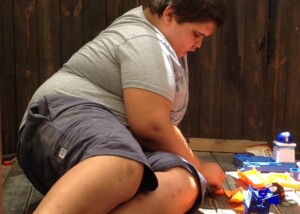
If data on life expectancy for autistic adults has you alarmed, remind yourself that obesity and inactivity are the biggest influencers, along with smoking, when it comes to how long one will live.
There is absolutely zero science to support the idea that autism, in and of itself, collectively reduces life expectancy for autistic individuals.
Many variables get thrown into the kettle when we look at the average lifespan for those on the Spectrum.
For example, are we looking at only Level 3 autism? But even Level 1 autism (minimal support needs) comes with shorter life expectancy.
One might suggest that the higher suicide rate among Autistics lowers the number.
But this doesn’t seem to apply when we look at the abysmally low life expectancy average for Level 3 autism.
That’s because those with severe and profound autism don’t typically face the mental turmoil of struggling to keep their mask on high to assimilate with social norms; trying to do well in the workplace and be accepted and not judged; and other experiences such as major burnout that can drive one into a deep depression and feelings of hopelessness.
Autism, in and of itself, does not damage the cardiovascular system, cause blood clots, lead to pneumonia or other forms of respiratory distress, liver failure or kidney disease, all of which are top killers of adults in general.
Worried about your autistic child’s life expectancy?
- If so, ask yourself how much physical activity they get.
- How much time each day do they spend seated?
Do you let them “just be” because you don’t believe they could adapt to an exercise regimen – even with continuous supervision?
Are you yourself sedentary and hence, have never given much thought about mandating structured exercise for your adult autistic son or daughter?
What makes up most of their diet: whole foods or ultra-processed convenience foods?
Are you tricked by Big Food into thinking that certain items are healthy when, in fact, they’re highly processed?
- Do you place convenience far ahead of healthfulness?
- Do you believe junk food is truly cheaper than healthful food?
- Do you associate overfeeding with taking good care of your child?
The Good News
The good news here is that all of these variables are heavily modifiable – literally at the blink of an eye!
For example, stop using food to comfort your autistic child, regardless of their age.
We all know how easy it is to put a bowl of ice cream with chunks of Oreos before an agitated child to calm them down.
But deep down inside, you know there has got to be a better way!
If feeding your child means that you, too, need to clean up your diet, then this is what you must do.
Take inventory of your cupboards, pantry and refrigerator. What percentage of the stock is highly processed foods?
What percentage is sugary foods? If your kid demands soda with his meals, where did they learn that?
And here’s a question: Have you, as the parent of a sedentary autistic child (regardless of age), done your part in seeking out fitness programs modified for special needs participants?
Even if there are no such programs in your area, what better way to introduce exercise to your child than to take it up yourself and include them!
Look, big changes aren’t always easy, but the changes you need to make to help your autistic child live a longer life are way easier than the changes you’ll need to make to accommodate lifestyle-caused chronic disease in your autistic child! Now reread that.
Inactivity Is Just As Dangerous As Smoking
Many parents of autistic grown kids or teens would be aghast if they found out they were smoking.
But ironically, these parents are perfectly okay with their kids’ sedentary lifestyles.
A growing body of research shows physical inactivity contributes hugely to mortality, disease and shortened life expectancy, in ways that rival the dangers of smoking.
A global analysis published in The Lancet estimates that a sedentary lifestyle is responsible for about 9% of premature deaths worldwide — over five million annually — an impact very similar in scale to deaths from tobacco use.
The same paper found inactivity contributes substantially to coronary heart disease, type 2 diabetes and certain cancers.
In the U.S., research using the NHANES data found that a lifestyle void of exercise advances the timing of death (for all-cause mortality) by about four years, compared to almost eight years for current smokers.
Just as you should be alarmed if your autistic child took up smoking, you should be equally alarmed if they spend much of their time in a chair.
And hey, if you’re on the Spectrum, then I – as a fellow Autist – sure hope that my article shakes you up into healthier lifestyle habits.
I’ve seen online posts by adult Autistics expressing worry over life expectancy data.
I wonder how many smoke; how many drink heavily; how many have a junk food diet; how many don’t make any effort to reverse their morbid obesity; and how many just outright refuse to get into a workout regimen and instead make excuses.









































